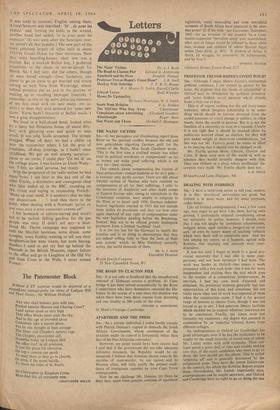PROFESSOR TREVOR-ROPER'S FINEST HOUR? SIR,—Although I enjoy Henry Fairlie's sentimental
political romances, I am moved to protest by his latest. He deplores that the 'needs of scholarship' at Oxford may be threatened by 'political pressures' and 'sonic faddish social purpose which already looks a little out of date.'
This is of course nothing but the old ivory-tower nonsense, which imagines scholarship to be some- th:ng which should be forever divorced from the sordid pressures of social change or politics; in other words, from the world in ,general. But it is not the function of a university to exist in a vacuum. Clearly it is not right that it should be mucked about by politicians worried about an election, fur they will give undue weight to short-term considerations, but this was not Mr. Fairlie's point; he seems in effect to be denying that it should ever be changed at all.
Mr. Fairlie quotes More, Linacre, Grocyn and Colet. If these were men of the world as well as scholars they • would certainly disagree with him. They saw Oxford as a place where intellectual dis- coveries were made. Mr. Fairlie clearly does 110I.






































 Previous page
Previous page